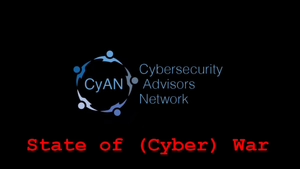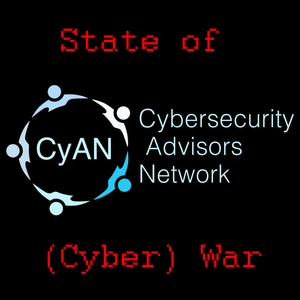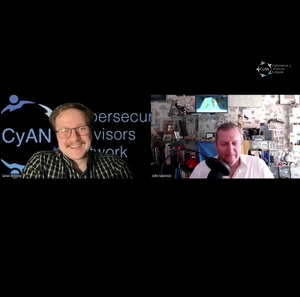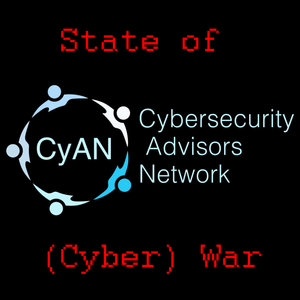
Cybersecurity Advisors Network
CyAN Staff
All episodes
Best episodes
Top 10 Cybersecurity Advisors Network Episodes
Goodpods has curated a list of the 10 best Cybersecurity Advisors Network episodes, ranked by the number of listens and likes each episode have garnered from our listeners. If you are listening to Cybersecurity Advisors Network for the first time, there's no better place to start than with one of these standout episodes. If you are a fan of the show, vote for your favorite Cybersecurity Advisors Network episode by adding your comments to the episode page.

Bjørn Ihler - Let's Talk Terrorism, Part II
Cybersecurity Advisors Network
05/19/25 • 37 min
Bjørn Ihler is Director of the Sweden-based Khalifa Ihler Institute, as well as founder and CEO of Revontulet, a Norwegian consultancy devoted to helping organisations protect themselves against terrorism and violent extremism.
We continue our conversation about terrorism - including whether the term has been watered down due to overuse, how we can spot extremist content, what some of the tactics of actors are, and how extremist and violent groups relate to more legitimate-yet-extreme political parties.
Notes and links:
Due to the volume of supporting links and text, we've listed them on the CyAN blog, available here: https://cybersecurityadvisors.network/2025/05/16/new-podcast-some-more-terrorism-with-bjorn-ihler/
Bjørn Ihler on LinkedIn: https://www.linkedin.com/in/bjornih
John Salomon on LinkedIn: https://www.linkedin.com/in/johnsalomon/
Check out the rest of CyAN's media channels on https://cybersecurityadvisors.network/media - and visit us at https://cybersecurityadvisors.network
Intro/outro music courtesy of Studio Kolomna via Pixabay: https://pixabay.com/users/studiokolomna-2073170/
Original video at https://youtu.be/PK7uG0h9A70

Disinformation, AI, and Security - Dmytro Bilash
Cybersecurity Advisors Network
11/23/23 • 36 min
Dmytro Bilash joins us for a conversation about online disinformation - what it is, how it adversely affects democratic societies, who's behind it, and how we can combat this major and growing threat to social cohesion and political and economic stability.
A few contextual link from our discussion:
Dr. Egor Zakharov of the Swiss Federal Polytechnic Institute, Zurich (ETHZ) - AI expert, and participant in the ITBN AI&disinformation fireside chat: https://ait.ethz.ch/people/egorzakharov
John Oliver/Last Week Tonight segment on Myanmar-related hate speech on Facebook: https://youtu.be/OjPYmEZxACM
The Assault on Intelligence, by Michael V. Hayden: https://www.penguinrandomhouse.com/books/566537/the-assault-on-intelligence-by-michael-v-hayden/
Offline, by Crooked Media - episode on TikTokers "discovering" Osama Bin Laden's "Letter to America": https://youtu.be/kk84mCHWds8
Shaping Europe's Digital Future - Tackling online disinformation: https://digital-strategy.ec.europa.eu/en/policies/online-disinformation
Finland is winning the war on fake news - CNN, 2019: https://edition.cnn.com/interactive/2019/05/europe/finland-fake-news-intl/
Dmytro Bilash is a cybersecurity expert and investor, and co-founder and Chief Business Development Officer of Osavul, a Ukrainian AI cyberdefence firm. Visit them at https://www.osavul.cloud/
You can find Dmytro on LinkedIn at https://www.linkedin.com/in/dmytro-bil
Check out the rest of CyAN's media channels on https://cybersecurityadvisors.network/media - and visit us at https://cybersecurityadvisors.network
Original video at https://youtu.be/XQonzP3OVXU
Intro/outro music courtesy of Studio Kolomna via Pixabay: https://pixabay.com/users/studiokolomna-2073170/

Israeli Cyberwarfare History and Capabilities
Cybersecurity Advisors Network
05/28/24 • 40 min
Join Hugo Tarrida and John Salomon for the latest part of our Middle East cyberwarfare mini-series.
We decided to split a more in-depth discussion about the two most capable actors in the region, Israel and Iran, into two half-episodes. Join us as we look at the organizations that make up Israeli cyberwarfare and -defense capabilities, the history of Israeli state-sponsored and state-aligned cyber campaigns,
We also take a brief tour of Israeli media and social media operations, including information, propaganda, disinformation, and manipulation.
If you haven't watched it yet, please consider checking out our first overview of the overall Middle East situation: https://youtu.be/X3wkTszRlck
Notes and links:Because of the highly emotionally and politically charged nature of current events, we can't tell how impartial many of the websites describing Israeli capabilities are or aren't. We will thus stick to Wikipedia unless there's either an original Israeli government webpage available, or a source we feel is somewhat authoritative, even if it's biased - in any case, do your own homework and draw your own conclusions, we're not here to push a narrative.
We have our own views and opinions of current events. This discussion is not intended to endorse or condemn any particular viewpoint.
Neither of us speaks even a bit of Hebrew. We are thus at the mercy of translation engines and webpages in languages we understand. Your mileage may vary.
02:03 CFR overview of cyberwarfare capabilities: https://www.cfr.org/cyber-operations/ 02:50 Unit 8200: https://en.wikipedia.org/wiki/Unit_8200 03:05 Military Intelligence Directorate, aka Aman: https://www.idf.il/en/mini-sites/directorates/military-intelligence-directorate/military-intelligence-directorate/ 03:57 Unit 81: https://en.wikipedia.org/wiki/Unit_81 05:01 Havatzalot: https://en.wikipedia.org/wiki/Havatzalot_Program - Google's horrible translation of the Hebrew wikipedia page indicates it's some kind of lily. Flowers are nice. 05:16 Talpiot: https://en.wikipedia.org/wiki/Talpiot_program - the name's apparently some biblical reference from Song of Songs 4:4 according to their LinkedIn page, that we can't figure out 06:55 Technion / Israel Institute of technology: https://www.technion.ac.il/ 06:56 Hebrew University of Jerusalem: https://en.huji.ac.il/ 07:30 IDF Information Security Department: https://en.wikipedia.org/wiki/Information_Security_Department - it's unclear whether it's the same as these guys: https://www.mitgaisim.idf.il/%D7%AA%D7%A4%D7%A7%D7%99%D7%93%D7%99%D7%9D/cyber-protection-unit/ 07:40 Mamram: https://en.wikipedia.org/wiki/Mamram - apparently an abbreviation of the Hebrew for "Center of Computing and Information Systems" 09:15 This may be the Israel Innovation Authority - https://innovationisrael.org.il/en/ - we're not 100% sure though 11:14 Stuxnet: https://www.wired.com/2014/11/countdown-to-zero-day-stuxnet/ 11:22 Specifically, Siemens PCS7, WinCC, and STEP7 control software, and various Siemens S7 programmable logic controllers (PLCs). 22:59 TAO: https://en.wikipedia.org/wiki/Tailored_Access_Operations 12:16 We're going to assume you're capable of looking up Snowden a...

50 Cent Army? What a Bargain! China and its Disinformation Campaigns
Cybersecurity Advisors Network
01/17/24 • 63 min
Join James Briscoe and John Salomon in the latest episode of the State of (Cyber)War podcast as they discuss the People's Republic of China and some of its disinformation capabilities.
This informal conversation includes discussion about Chinese foreign election interference, domestic social media manipulation, Taiwan, China's foreign political and economic interests and more.
John Salomon - https://www.linkedin.com/in/johnsalomon/ James Briscoe - https://www.linkedin.com/in/jimbriscoe/
02:10 Xi Jinping's new year's address, via CCTV: https://youtu.be/TEd3CtcL1pU?si=MAiKGP-SPjm8cjCe 02:50 Xi Zhongxun, Chinese revolutionary leader: https://en.wikipedia.org/wiki/Xi_Zhongxun 04:00 Taiwanese elections 2024: https://en.wikipedia.org/wiki/2024_Taiwanese_general_election 04:08 Kuomintang: https://en.wikipedia.org/wiki/Kuomintang 04:27 Democratic Progressive Party: https://en.wikipedia.org/wiki/Democratic_Progressive_Party 05:45 1992 Consensus: https://thediplomat.com/2022/07/the-1992-consensus-why-it-worked-and-why-it-fell-apart/ 07:15 These are the Valemax ore carriers: https://vale.com/w/fleet-of-ships-serving-vale-receives-first-ore-carrier-in-the-world-equipped-with-rotor-sails 09:12 50 Cent Party: https://en.wikipedia.org/wiki/50_Cent_Party 09:52 Nine-dotted line: https://en.wikipedia.org/wiki/Nine-dash_line 10:04 Belt and Road Initiative: https://www.cfr.org/backgrounder/chinas-massive-belt-and-road-initiative 13:00 https://www.reuters.com/article/idUSSIN277923/ 13:43 NY Times article on the topic: https://www.nytimes.com/2023/09/11/us/politics/china-disinformation-ai.html 14:15 https://en.wikipedia.org/wiki/2023_Chinese_balloon_incident 14:42 A lot of this is obviously speculation. https://www.wired.com/story/east-palestine-ohio-train-derailment-tiktok/ 16:42 Asia Infrastructure Investment Bank: https://www.aiib.org/en/index.html 19:35 An article about PRC influence on the Taiwanese elections: https://www.theguardian.com/world/2024/jan/09/taiwan-presidential-election-china-influence 20:32 https://www.npr.org/2023/11/30/1215898523/meta-warns-china-online-social-media-influence-operations-facebook-elections 21:05 A US State Department briefing on this topic: https://www.state.gov/briefings-foreign-press-centers/how-the-prc-amplifies-russian-disinformation 24:15 United Front Work Department: https://en.wikipedia.org/wiki/United_Front_Work_Department 26:25 Some points about interference in US elections: https://gdil.org/russian-and-chinese-influence-actors-and-operations-against-the-american-electorate/ 29:34 Hundred Years of Humiliation: https://en.wikipedia.org/wiki/Century_of_humiliation 30:30 The Avoidable War, by Kevin Rudd: https://www.avoidablewar.com/ 32:23 Natto Thoughts: https://nattothoughts.substack.com/ 32:26 The disinformation handbook (part I): https://nattothoughts.substack.com/p/disinformation-handbook-a-concise
A few links on the topic worth reading:
Chinese information operations against Taiwan:
https://therecord.media/taiwan-elections-china-interference https://www.theguardian.com/world/2024/jan/09/taiwan-presidential-election-china-influence https://thediplomat.com/2024/01/beijing-tries-to-capitalize-on-taiwans-controversial-rocket-alert/ https://thediplomat.com/2024/01/rip-off-the-blindfold-let-taiwanese-civil-society-learn-from-ukraine/ https://fpri.org/article/2023/12/whats-at-stake-in-upcoming-taiwan-election/
General Chinese disinfo operations:
https://www.rand.org/pubs/commentary/2023/10/dismantling-the-disinformation-business-of-chinese.html https://www.defenceconnect.com.au/joint-capabilities/13356-report-massive-chinese-disinformation-campaign-uncovered-on-youtube
https://medium.com/doublethinklab/propaganda-analysis-how-different-actors-in-chinas-information-ecosystem-portray-the-ukraine-war-ac82713c2f68 https://www.npr.org/2023/11/30/1215898523/meta-warns-china-online-social-media-influence-operations-facebook-elections
The State of (Cyber)War is a project by members of the Cybersecurity Advisors Network (CyAN), with an interest in information security topics relevant to geopolitics, military cyberdefence, diplomacy, and other international topics. We discuss various aspects of both current and past issues from the point of view of interested amateurs with varying degrees of experience in the field, in a not-always-entirely-serious format.
Visit the Cybersecurity Advisors Network at https://cybersecurityadvisors.network
Intro music courtesy of AlexiAction via Pixabay: https://pixabay.com/users/alexiaction-26977400/ Outro music courtesy of Studio Kolomna via Pixabay: https://pixabay.com/users/studiokolomna-2073170/
Original YouTube video at https://youtu.be/xBAJ2rBKrMc

Linux Malware and Security, with Craig Rowland
Cybersecurity Advisors Network
04/17/24 • 44 min
In today's conversation, Craig Rowland joins us to talk about the often overlooked significance of Linux as a key part of global communications and computing infrastructure, and discuss various types threats targeting Linux systems.
Malware, attackers, and techniques are often very distinct from those seen on Windows; Craig shares insights all of these from his extensive experience both writing and reverse-engineering Linux malware.
Craig is CEO of Sandfly Security, a New Zealand-based provider of Linux threat behavior scanning tools. Full disclosure: John Salomon is a paid consultant to Sandfly Security.
Notes from the video:
03:48 I can't find a source for the 95% figure, but a 2023 ZDNet article says 90%, which seems to be the most common figure: https://www.zdnet.com/article/linux-has-over-3-of-the-desktop-market-its-more-complicated-than-that/ 03:55 Percentage of top million websites running Linux is another interesting statistic, which seems to be well above 90%. For example: https://gitnux.org/linux-statistics/ 04:08 https://www.linuxinsider.com/story/the-flying-penguin-linux-in-flight-entertainment-systems-65541.html etc. etc. 05:54 France's Gendarmerie Nationale: https://en.wikipedia.org/wiki/GendBuntu 06:40 https://www.zdnet.com/article/linux-not-windows-why-munich-is-shifting-back-from-microsoft-to-open-source-again/ 14:10 A propos, F5 has some interesting ways of using web shells as an attack vector: https://www.f5.com/labs/learning-center/web-shells-understanding-attackers-tools-and-techniques 14:40 "attacks on kubernetes" is a fun web search string. Same for "attacks on S3 buckets". Enjoy. 14:56 https://redis.io/solutions/messaging/ 15:42 https://en.wikipedia.org/wiki/Patch_Tuesday 17:40 To be fair, Bob in Accounting is a pretty powerful entry point to the organization for various types of cyberattackers. 19:35 Mirai botnet: https://www.cloudflare.com/learning/ddos/glossary/mirai-botnet/ 19:37 NoaBot: https://www.akamai.com/blog/security-research/mirai-based-noabot-crypto-mining 20:35 Chroot (change root directory): https://wiki.archlinux.org/title/chroot 27:42 PuTTY: https://www.putty.org/ 29:45 There are several cryptojackers that try to neutralize competing malware, e.g. ChaosRAT https://www.trendmicro.com/en_th/research/22/l/linux-cryptomining-enhanced-via-chaos-rat-.html or Jenkins https://www.f5.com/labs/articles/threat-intelligence/new-jenkins-campaign-hides-malware--kills-competing-crypto-miner 35:30 For example LockBit: https://www.akamai.com/blog/security/learning-from-the-lockbit-takedown 35:37 My mistake - AvosLocker is also a Linux port of Windows malware: https://www.trendmicro.com/vinfo/us/security/news/ransomware-spotlight/ransomware-spotlight-avoslocker - HiddenWasp may be a better example: https://www.trendmicro.com/vinfo/us/security/news/cyber-attacks/hiddenwasp-malware-targets-linux-systems-borrows-code-from-mirai-winnti 35:42 Diamorphine LKM rootkit: https://github.com/m0nad/Diamorphine 36:44 https://core.vmware.com/esxi - an example is ESXiArgs ransomware: https://www.cisa.gov/news-events/cybersecurity-advisories/aa23-039a 38:42 Abuse.ch MalwareBazaar: https://bazaar.abuse.ch/ 38:49 Fraunhofer FKIE Malpedia: https://malpedia.caad.fkie.fraunhofer.de 39:35 You could just run a Linux version of the virus aquarium: https://xkcd.com/350/ 39:52 A few examples of VM detection: https://www.cynet.com/attack-techniques-hands-on/malware-anti-vm-techniques/ 41:15 Joe Sandbox: https://www.joesandbox.com/ 42:10 No I won't, because I can't find it. Bit of Baader-Meinhof going on there... 42:59 https://www.youtube.com/@SandflySecurity
Craig on LinkedIn: https://www.linkedin.com/in/craighrowland/ Sandfly Security: https://sandflysecurity.com
Check out the rest of CyAN's media channels on https://cybersecurityadvisors.network/media - and visit us at https://cybersecurityadvisors.network
Intro/outro music courtesy of Studio Kolomna via Pixabay: https://pixabay.com/users/studiokolomna-2073170/
Original video available at https://youtu.be/W-7edx7Le6Y?si=NOoOy1kF3KiVOPUe

China's Increasingly Muscular Cyberwarfare Capability
Cybersecurity Advisors Network
03/05/24 • 38 min
In today's episode of State of (Cyber)War, Hugo Tarrida and John Salomon talk about China's approach to cyberwar. What is the history behind Chinese cyber capabilities? What are Chinese geopolitical, economic, and social objectives that drive their international cyber activities? What are some of the biases that we should be aware of when evaluating the trajectory of China and its cyberwar abilities?
Also don't forget to check out our previous video about Chinese disinformation activities here: https://youtu.be/xBAJ2rBKrMc
Notes and links:
Hugo Tarrida on LinkedIn: https://www.linkedin.com/in/hugo-tarrida-32915a204/ John Salomon on LinkedIn: https://www.linkedin.com/in/johnsalomon/
Wikipedia article worth reading about Chinese cyber warfare: https://en.wikipedia.org/wiki/Cyberwarfare_by_China
05:42 Granted, Stuxnet was a joint US-Israeli venture - https://en.wikipedia.org/wiki/Stuxnet 07:06 https://www.reuters.com/world/russia-says-its-working-major-new-agreement-with-iran-2023-12-12/ 14:05 Titan Rain - https://en.wikipedia.org/wiki/Titan_Rain Related: Operation Aurora (2009) - https://en.wikipedia.org/wiki/Operation_Aurora 15:20 https://www.npr.org/2022/05/11/1098368201/a-spying-scandal-and-the-fate-of-western-sahara 17:07 The case of Wen Ho Lee, one of several perpetrators of military espionage: https://sgp.fas.org/crs/nuke/RL30143.pdf 20:30 https://nattothoughts.substack.com - Nellie Ohr and her team do excellent analysis work 20:50 "An Analysis of China's Great Cannon" - https://www.usenix.org/system/files/conference/foci15/foci15-paper-marczak.pdf Shoutout to fellow UC Berkeley CSUA member Nick Weaver for co-authoring this paper) 27:48 E.g. "The 'Century of Humiliation' and China's National Narratives" - https://www.uscc.gov/sites/default/files/3.10.11Kaufman.pdf 29:42 Belt and Road Initiative - https://www.cfr.org/backgrounder/chinas-massive-belt-and-road-initiative 32:38 Referenced here: https://en.wikipedia.org/wiki/Chinese_information_operations_and_information_warfare ("Definitions" section) 32:45 The Three Warfares: https://apps.dtic.mil/sti/tr/pdf/ADB372300.pdf 34:04 The Nine-Dash Line: https://chinaus-icas.org/research/map-spotlight-nine-dash-line/ 34:52 In fact, ruled to be explicitly illegal by the Permanent Court of Arbitration in 2016: https://pca-cpa.org/en/news/pca-press-release-the-south-china-sea-arbitration-the-republic-of-the-philippines-v-the-peoples-republic-of-china/ 36:19 US FBI director Christopher Wray recently warned about this: https://www.npr.org/2024/01/31/1228153857/wray-chinese-hackers-national-security
The State of (Cyber)War is a project by members of the Cybersecurity Advisors Network (CyAN), with an interest in information security topics relevant to geopolitics, military cyberdefence, diplomacy, and other international topics. We discuss various aspects of both current and past issues from the point of view of interested amateurs with varying degrees of experience in the field, in a not-always-entirely-serious format.
Visit the Cybersecurity Advisors Network at https://cybersecurityadvisors.network
Intro music courtesy of AlexiAction via Pixabay: https://pixabay.com/users/alexiaction-26977400/
Outro music courtesy of Studio Kolomna via Pixabay: https://pixabay.com/users/studiokolomna-2073170/
Original YouTube video at https://youtu.be/HLVPDojARh0

Japan's National Cyberdefence - It's Not a Military Thing, Honest
Cybersecurity Advisors Network
12/27/23 • 24 min
Welcome to episode 2 of CyAN's State of (Cyber) War series.
Today, James Briscoe and John Salomon talk about Japan - its national cyberdefence capabilities, the regional and global threat landscape, regulations and laws, and how all of these are evolving in the face of changing geopolitical realities and technologies.
A few notes from our chat:
02:25 US-Japan 1960 joint security treaty: https://www.mofa.go.jp/region/n-america/us/q&a/ref/1.html 02:37 Article 9 Japanese constitution: https://en.wikipedia.org/wiki/Article_9_of_the_Japanese_Constitution 02:45 SCAP: Supreme commander allied powers 02:58 Japan Self Defense Forces: https://en.wikipedia.org/wiki/Japan_Self-Defense_Forces 05:01 2019 US-Japan security treaty update: https://www.mofa.go.jp/files/000470738.pdf 06:54 national security strategy end of 2022: https://www.cas.go.jp/jp/siryou/221216anzenhoshou/nss-e.pdf 08:14 Lazarus Group: https://www.aljazeera.com/news/2023/12/9/us-japan-south-korea-launch-new-efforts-to-counter-n-korea-cyber-threats 10:35 Lazarus Group's cryptocurrency thefts: https://www.coindesk.com/markets/2023/12/01/north-korean-hackers-lazarus-group-stolen-3b-in-cryptocurrency/ 11:29 https://www.dragonflyintelligence.com/news/japan-shift-to-a-more-offensive-cyber-posture-in-2023/ 11:35 https://asia.nikkei.com/Politics/Japan-to-quadruple-cyber-defense-forces-meeting-threats-head-on 12:47 The 2016 revision in question: https://www.mofa.go.jp/files/000143304.pdf 13:37 The spending increase to 2% request: https://www.reuters.com/business/aerospace-defense/japan-makes-record-defence-spending-request-amid-tension-with-china-2023-08-31/ 13:59 It's actually 2% as well: https://www.nato.int/docu/review/articles/2023/07/03/defence-spending-sustaining-the-effort-in-the-long-term/index.html 14:39 CCDCOE: https://ccdcoe.org/ 14:46 Locked Shields exercise: https://ccdcoe.org/exercises/locked-shields/ 15:33 The official in question was former US Director of National Intelligence Dennis Blair: https://japannews.yomiuri.co.jp/politics/political-series/20221122-72394/ 16:05 The Japanese National Security Strategy allows for development of a posture for information warfare and introduction of active cyber defence in cybersecurity. It will create a government information warfare department, allowing government to aggregate and analyze the situation on disinformation originated abroad. The National Center for Incident Readiness and Strategy for Cybersecurity is to be restructured to establish an new organisation to coordinate policies between the police and JSDF. This will allow for active cyber defence against attackers. Training for 4000 cyber ‘warriors’ and 16k cyber-capable JSDF members over 5 years is also foreseen. The Ministry of Foreign Affairs plans AI to enhance monitoring of information and intelligence analysis. Furthermore, defence industry profit margin will be permitted to increase to a max of 15%. 16:45 The Nagoya port ransomware attack of July 2023: https://www.bloomberg.com/news/articles/2023-07-06/nagoya-port-delays-restart-following-alleged-ransomware-attack 17:10 The Chinese cyberattack on the Japanese defence network: https://www.japantimes.co.jp/news/2023/08/08/japan/japan-china-hack-defense-network/ - WaPo article: https://www.washingtonpost.com/national-security/2023/08/07/china-japan-hack-pentagon/ 17:23 KillNet ceases attacks on Japan: https://english.kyodonews.net/news/2022/09/9846d4bf7aee-pro-russia-hacker-group-stops-cyberattacks-on-japan-due-to-money-woes.html 20:17 2023 Amendments to Telecommunications Business Act: https://www.dataguidance.com/news/japan-amendments-telecommunications-business-act-enter 20:20 Unauthorized Computer Access Law (UCAL): https://iclg.com/practice-areas/cybersecurity-laws-and-regulations/japan
James Briscoe on LinkedIn: https://www.linkedin.com/in/jimbriscoe/ John Salomon on LinkedIn: https://www.linkedin.com/in/johnsalomon/
Check out the rest of CyAN's media channels on https://cybersecurityadvisors.network/media - and visit us at https://cybersecurityadvisors.network
Original YouTube video version: https://youtu.be/Fmuno8ohJPs
Intro/outro music courtesy of AlexiAction via Pixabay: https://pixabay.com/users/alexiaction-26977400/

State of (Cyber) War - Russia, Offensive Cyber Operations, and Terror, Oh My
Cybersecurity Advisors Network
12/21/23 • 33 min
Welcome to episode 1 of CyAN's new State of (Cyber) War series.
Join John Salomon and James Briscoe in a discussion of offensive cyberoperations involving Russian actors, parallels to historical attacks on civilians, expectations and limitations of information operations, and more.
A few notes from our chat:
05:10 James' research paper on Russia/Ukraine: https://www.linkedin.com/feed/update/urn:li:activity:6899132398601162752/ 05:30 Conti ransomware group: https://flashpoint.io/blog/history-of-conti-ransomware/ 08:55 2016 Ukraine power grid attacks: https://www.wired.com/story/russia-ukraine-cyberattack-power-grid-blackout-destruction/ 11:15 Stuxnet: https://en.wikipedia.org/wiki/Stuxnet 12:47 James' follow-up work: https://www.linkedin.com/feed/update/urn:li:activity:6944843584533581824/ 14:35 The Dukes: https://www.cfr.org/cyber-operations/dukes Cozy Bear: https://www.crowdstrike.com/adversaries/cozy-bear/ NotPetya: https://en.wikipedia.org/wiki/2017_Ukraine_ransomware_attacks 18:32 Lazarus Group: https://www.trendmicro.com/vinfo/pl/security/news/cybercrime-and-digital-threats/a-look-into-the-lazarus-groups-operations 20:11 2022 Yandex Moscow taxi hack: https://www.euronews.com/my-europe/2022/09/02/gridlock-as-hackers-order-hundreds-of-taxis-to-same-place-in-moscow 20:25 2023 GUR Russian state tax service hack: https://therecord.media/ukraine-intelligence-claims-attack-on-russia-tax-service 23:22 2022 Belarus railway hack: https://www.theguardian.com/world/2022/jan/25/cyberpartisans-hack-belarusian-railway-to-disrupt-russian-buildup 24:04 Alexander Lukashenko and the Ukraine invasion map: https://www.independent.co.uk/news/world/europe/lukashenko-ukraine-russia-belarus-invasion-map-b2026440.html 25:23 Syrian Electronic Army: https://en.wikipedia.org/wiki/Syrian_Electronic_Army 29:03 Momotarō no Umiwashi came out in 1942: https://en.wikipedia.org/wiki/Momotar%C5%8D_no_Umiwashi
Original YouTube video is at https://youtu.be/VlP_L3xX2Lo
James Briscoe on LinkedIn: https://www.linkedin.com/in/jimbriscoe/ John Salomon on LinkedIn: https://www.linkedin.com/in/johnsalomon/
Check out the rest of CyAN's media channels on https://cybersecurityadvisors.network/media - and visit us at https://cybersecurityadvisors.network
Intro/outro music courtesy of AlexiAction via Pixabay: https://pixabay.com/users/alexiaction-26977400/

The WTO, the World Bank, Risk, Digitalisation, a Secure Digital ecosystem, and more
Cybersecurity Advisors Network
11/05/21 • 35 min
In this “Secure In Mind” episode, it was a privilege to welcome John W.H. Denton to the podcast for a second time. John is the Secretary-General of the International Chamber of Commerce and with him we discussed the WTO, the World Bank, risk, digitisation, a secure digital ecosystem, and more.

Let's Talk Terrorism, With Bjørn Ihler
Cybersecurity Advisors Network
05/15/25 • 38 min
Bjørn Ihler is Director of the Sweden-based Khalifa Ihler Institute, as well as founder and CEO of Revontulet, a Norwegian consultancy devoted to helping organisations protect themselves against terrorism and violent extremism.
An activist, expert, and frequent speaker on the topic of terrorist and violent extremist content (TVEC), Bjørn joins us today to share his thoughts on the very broad topic of "terrorism". What is it, who are the major actors, who is affected and how, where does terrorism come from, and more - these are all topics that we touch on in this fascinating introduction to an area that's often clouded by buzzwords and sensationalism.
Notes and links:
Due to the volume of supporting links and text, we've listed them on the CyAN blog, available here: https://cybersecurityadvisors.network/2025/05/15/new-podcast-terrorism-with-bjorn-ihler/
Bjørn Ihler on LinkedIn: https://www.linkedin.com/in/bjornih
John Salomon on LinkedIn: https://www.linkedin.com/in/johnsalomon/
Check out the rest of CyAN's media channels on https://cybersecurityadvisors.network/media - and visit us at https://cybersecurityadvisors.network
Intro/outro music courtesy of Studio Kolomna via Pixabay: https://pixabay.com/users/studiokolomna-2073170/
Original video episode is at https://youtu.be/cyHFNfeYN2M
Show more best episodes

Show more best episodes
FAQ
How many episodes does Cybersecurity Advisors Network have?
Cybersecurity Advisors Network currently has 80 episodes available.
What topics does Cybersecurity Advisors Network cover?
The podcast is about News, Security, Tech News, Podcasts, Technology, Internet and Cybersecurity.
What is the most popular episode on Cybersecurity Advisors Network?
The episode title 'Linux Malware and Security, with Craig Rowland' is the most popular.
What is the average episode length on Cybersecurity Advisors Network?
The average episode length on Cybersecurity Advisors Network is 44 minutes.
How often are episodes of Cybersecurity Advisors Network released?
Episodes of Cybersecurity Advisors Network are typically released every 5 hours.
When was the first episode of Cybersecurity Advisors Network?
The first episode of Cybersecurity Advisors Network was released on Mar 17, 2021.
Show more FAQ

Show more FAQ